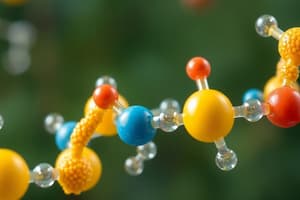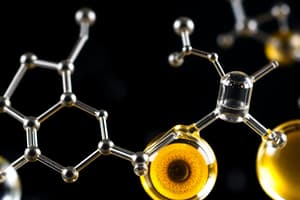Podcast
Questions and Answers
What are nutrients?
What are nutrients?
Nutrients are chemical substances in food that provide energy and materials needed by the body. There are three types of nutrients: carbohydrates, fats, and proteins.
What do nutrients do?
What do nutrients do?
Provide energy for vital activities, supply raw materials to make new protoplasm, and help us stay healthy.
What does water do in humans?
What does water do in humans?
Water acts as a solvent for chemical reactions, is essential for cells and fluids, controls body temperature, and helps transport dissolved substances.
What does water do in plants?
What does water do in plants?
Why do we need more water or why do we lose water?
Why do we need more water or why do we lose water?
What are monosaccharides?
What are monosaccharides?
What is hydrolysis?
What is hydrolysis?
What is sucrose?
What is sucrose?
What is lactose?
What is lactose?
What is maltose?
What is maltose?
Why are glycogen and starch suitable storage materials in cells?
Why are glycogen and starch suitable storage materials in cells?
What are polysaccharides?
What are polysaccharides?
How do you test for starch?
How do you test for starch?
How do you test for reducing sugars?
How do you test for reducing sugars?
Why is water needed?
Why is water needed?
Flashcards are hidden until you start studying
Study Notes
Nutrients
- Nutrients are chemical substances in food providing energy and materials for bodily functions.
- Major types of nutrients include carbohydrates, fats, and proteins.
Functions of Nutrients
- Provide energy essential for vital activities; for instance, photosynthesis converts light energy to chemical energy.
- Supply raw materials for creating new protoplasm, aiding in repair of worn-out body parts.
- Contribute to overall health; Vitamin C and calcium are pivotal for bodily functions.
Role of Water in Humans
- Acts as a solvent where chemical reactions, such as hydrolysis, occur.
- Integral to cells, tissue fluids, digestive juices, and blood.
- Regulates body temperature through sweat evaporation, which dissipates heat.
- Facilitates transport of dissolved substances; moves nutrients from the small intestine and eliminates waste.
Role of Water in Plants
- Crucial for photosynthesis, enabling plants to convert light into energy.
- Maintains turgidity of plant cells, supporting upright structure.
- Essential for transporting mineral salts via xylem and food substances from leaves to other plant parts.
Water Loss and Requirements
- Water loss occurs through breathing, sweating, and urination, necessitating replacement.
- Individual water needs vary based on activity level, health status, and environmental conditions.
Sacharrides Classification
- Monosaccharides: Single sugars including glucose, fructose, and galactose.
- Disaccharides: Double sugars like maltose, sucrose, and lactose.
- Polysaccharides: Complex carbohydrates such as starch, glycogen, and cellulose.
Monosaccharides
- Glucose: Found in both plants and animals as an energy source.
- Fructose: Common in plants; rare in animals.
- Galactose: Found in milk sugar of mammals.
Hydrolysis
- Hydrolysis is a reaction where water breaks down complex molecules into simpler ones, e.g., splitting a disaccharide into monosaccharides with enzyme aid.
Sucrose
- Present mainly in sugarcane, beet roots, sweet fruits, and certain vegetables.
- Composed of glucose and fructose; common granulated sugar consists of sucrose.
Lactose (Milk Sugar)
- Found in mammalian milk, formed by glucose and galactose.
Maltose (Malt Sugar)
- Derived from malted cereals like barley, consisting of two glucose molecules.
- Initiates starch digestion.
Storage of Glycogen and Starch
- Insoluble in water, preventing changes in water potential within cells.
- Large molecules that do not diffuse through cell membranes, ensuring retention in cells.
- Easily hydrolyzed to glucose during tissue respiration, and their compact shapes occupy less space than individual glucose molecules.
Polysaccharides
- Starch: Storage form of carbohydrates found in plant storage organs.
- Cellulose: Found in plant cell walls, provides protection, and serves as dietary fiber.
- Glycogen: Animal storage form of carbohydrates, readily converted to glucose when needed.
Testing for Starch
- Iodine test indicates starch presence, producing a blue-black solution.
Testing for Reducing Sugars
- Reducing sugars yield a brick-red precipitate when mixed with Benedict's solution and boiled.
- The Benedict's test identifies reducing sugars with free ketone or aldehyde groups and can check for glucose in urine.
Importance of Water
- Serves as a substrate in respiration, aiding energy provision for cellular activities.
- Contributes to the formation of supporting structures, such as plant cell walls.
- Facilitates conversion into organic compounds like amino acids and fats.
- Essential for nucleic acid formation.
Studying That Suits You
Use AI to generate personalized quizzes and flashcards to suit your learning preferences.




